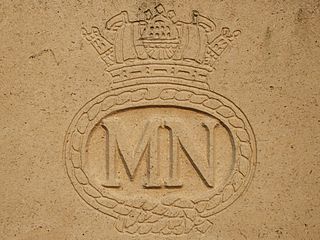
The British Merchant Navy is the collective name given to British civilian ships and their associated crews, including officers and ratings. In the UK, it is simply referred to as the Merchant Navy or MN. Merchant Navy vessels fly the Red Ensign and the ships and crew are regulated by the Maritime and Coastguard Agency (MCA), a specialist agency of the UK Department of Transport. British merchant ships are registered under the UK or Red Ensign group ship registries. British Merchant Navy deck officers and ratings are certificated and trained according to STCW Convention and the syllabus of the Merchant Navy Training Board in maritime colleges and other training institutes around the UK.
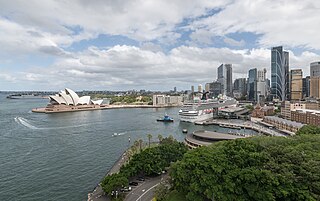
Circular Quay is a harbour, former working port and now international passenger shipping terminal, public piazza and tourism precinct, heritage area, and transport node located in Sydney, New South Wales, Australia, on the northern edge of the Sydney central business district on Sydney Cove, between Bennelong Point and The Rocks. It is part of the local government area of the City of Sydney.
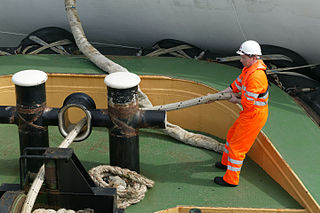
The Mission to Seafarers is a Christian welfare charity serving merchant crews around the world. It operates through a global Mission 'family' network of chaplains, staff and volunteers and provides practical, emotional and spiritual support through ship visits, drop-in seafarers centres and a range of welfare and emergency support services.

Thomas Kendall was a schoolmaster, an early missionary to Māori people in New Zealand, and a recorder of the Māori language. An evangelical Anglican, he and his family were in the first group of missionaries to New Zealand, accompanied to the Bay of Islands by Samuel Marsden in December 1814 and settling there. He wrote the first book in Māori, published in 1815. By 1821 he felt it necessary to accede to local Māori demands for guns in order to ensure their continued protection of the mission, and the Church Missionary Society dismissed him in 1822 for gun dealing. Marsden visited New Zealand to dismiss him in person in 1823, after learning that he had committed adultery with a Māori woman. Kendall left New Zealand in 1825 and died in a ship sinking in Australia in 1832.
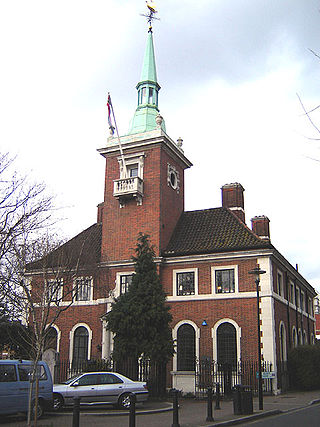
The Norwegian Church Abroad or The Norwegian Seamen’s Church is a religious organisation serving Norwegians and other Scandinavians travelling abroad. Founded in 1864, The Norwegian Seamen's Mission – Sjømannsmisjonen – was established to secure the moral and religious education of Scandinavian seafarers, but also to give them a "breathing room" where a fellow countryman was available to lend an ear and give some attention. The churches and their staff together with travelling pastors around the globe represent a "resource center" for all Norwegians travelling internationally.
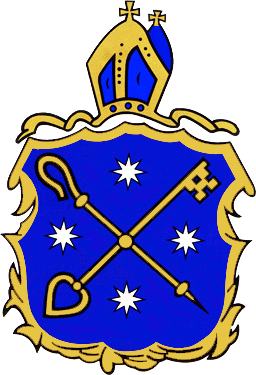
The Anglican Diocese of Tasmania includes the entire Tasmanian state of Australia and is an extraprovincial diocese of the Anglican Church of Australia.
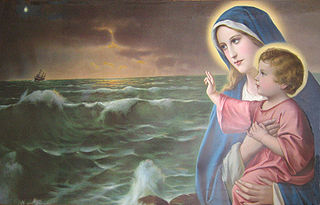
Stella Maris is an international agency of the Catholic Church that provides pastoral care to seafarers, other maritime workers, and their families.

The International Christian Maritime Association (ICMA) is an ecumenical association of 26 Christian organisations, Protestant and Catholic, representing different churches and Christian communities actively engaged in welfare work for people who work at sea, including seafarers, fishers and the families of both. The Association is registered as a charity in the UK and, through its members, operates internationally.
Sailors’ Society is an international Christian charity working in ports across the world. The organisation has chaplains and ship visitors in 91 global ports, who help seafarers and their families, from all faiths and none, with welfare and practical support.

The Maritime Labour Convention (MLC) is an International Labour Organization (ILO) convention, number 186, established in 2006 as the fourth pillar of international maritime law and embodies "all up-to-date standards of existing international maritime labour Conventions and Recommendations, as well as the fundamental principles to be found in other international labour Conventions". The other pillars are the SOLAS, STCW and MARPOL. The treaties applies to all ships entering the harbours of parties to the treaty (port states), as well as to all ships flying the flag of state party (flag states, as of 2021: over 97 per cent).

The Boston Seaman's Friend Society or Seafarer's Friend is a charitable religious organization based in Boston, Massachusetts. It aims to improve the welfare of mariners.

Edward Thompson Taylor was an American Methodist minister. He joined the New England Annual Conference of the Methodist Episcopal Church in 1819 and was an itinerant preacher in southeastern New England for 10 years. In 1829, the Port Society of Boston hired Taylor to be the chaplain of the Seamen’s Bethel, a mission to sailors. In Boston, “Father Taylor” became famous as an eloquent and colorful preacher, a sailors’ advocate, and a temperance activist.

Samuel Chenery Damon was a missionary to Hawaii, pastor of the Seamen's Bethel Church, chaplain of the Honolulu American Seamen's Friend Society and editor of the monthly newspaper The Friend.
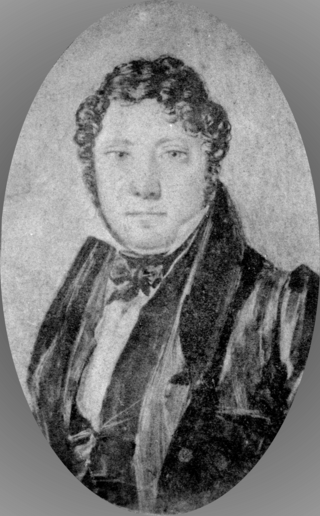
Captain John Dibbs was a master mariner prominent during 1822–1835 in the seas around the colony of New South Wales, New Zealand and the Society Islands. Dibbs was master of the colonial schooner Endeavour 1822–1824, the brig Haweis 1824–1827 and the barque Lady Blackwood 1827–1834. He is credited as the European discoverer of Rarotonga and several other islands. Most of his voyages involved the transporting of missionaries, trade, whaling and seal hunting. He was believed for over 170 years to have disappeared at sea in 1835. He was the father of Sir George Dibbs, a pre-Federation Australian politician, Sir Thomas Dibbs, an Australian banker, and John Campbell Dibbs, a successful Sydney businessman.
Edward Lombe was a merchantman and passenger three-masted barque built in 1828 by Thomas Brodrick, of Whitby, England.
The Merchant Navy Welfare Board (MNWB) is a registered charity located in Southampton, England, that acts as the welfare umbrella for the United Kingdom Merchant Navy and fishing fleet charity sector. Its mission is "Improving the lives of seafarers and fishers by raising welfare standards in collaboration with our stakeholders".
Hibernia was a passenger ship built at Prince Edward's Island in 1828. She was transporting passengers from Liverpool to Australia when a shipboard fire in the South Atlantic on 5 February 1833 destroyed her.
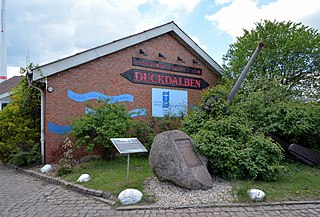
Duckdalben – International Seamen's Club is the name of the seamen's club founded in 1986 in the Port of Hamburg by the Deutsche Seemannsmission Hamburg-Harburg e. V. Every year, around 35,000 seafarers from more than 100 countries are offered practical help and orientation in what is for them a foreign port. Duckdalben is named after the mooring pilings called Dalben. In 2011 it was named the world's best seamen's club.

The Mariners' Church is a heritage-listed former church and seamen's mission and now nightclub, bar and restaurant located at 98–100 George Street in the inner city Sydney suburb of The Rocks in the City of Sydney local government area of New South Wales, Australia. It was designed in various stages by J. Bibb, H. C. Kent and Kent & Massie and was built from 1856 to 1859. It is also known as Mission to Seamen; Rawson Institute for Seamen & Mariners' Church; Craft Centre. The property is owned by Sydney Harbour Foreshore Authority, an agency of the Government of New South Wales. It was added to the New South Wales State Heritage Register on 10 May 2002. The building was previously a cafe, place of worship and craft centre.
The North American Maritime Ministry Association (NAMMA) is an ecumenical Christian seafarers’ welfare organization and professional association for seafarers’ welfare workers.
















